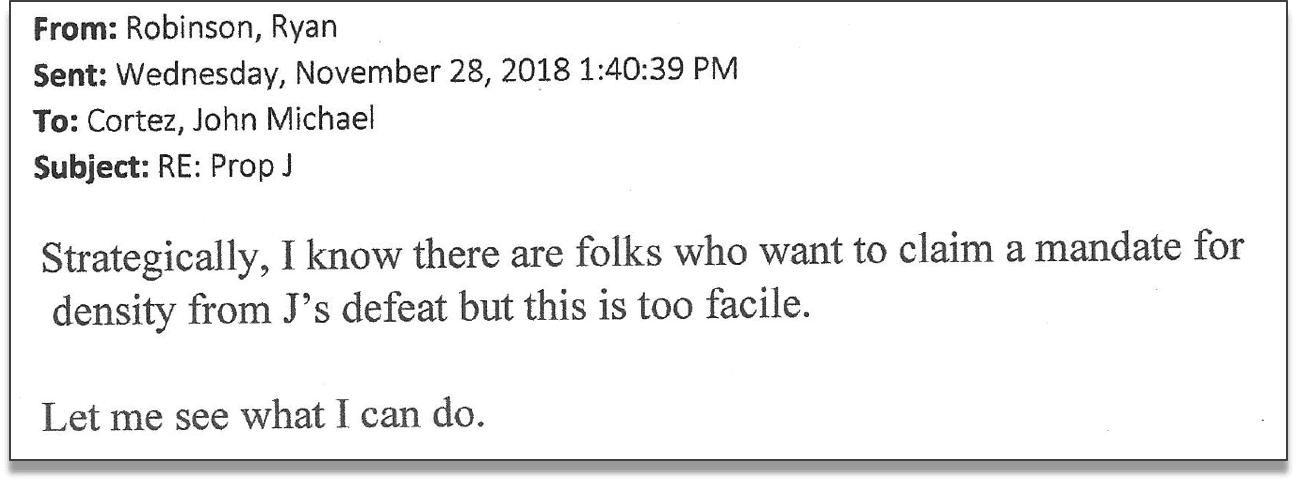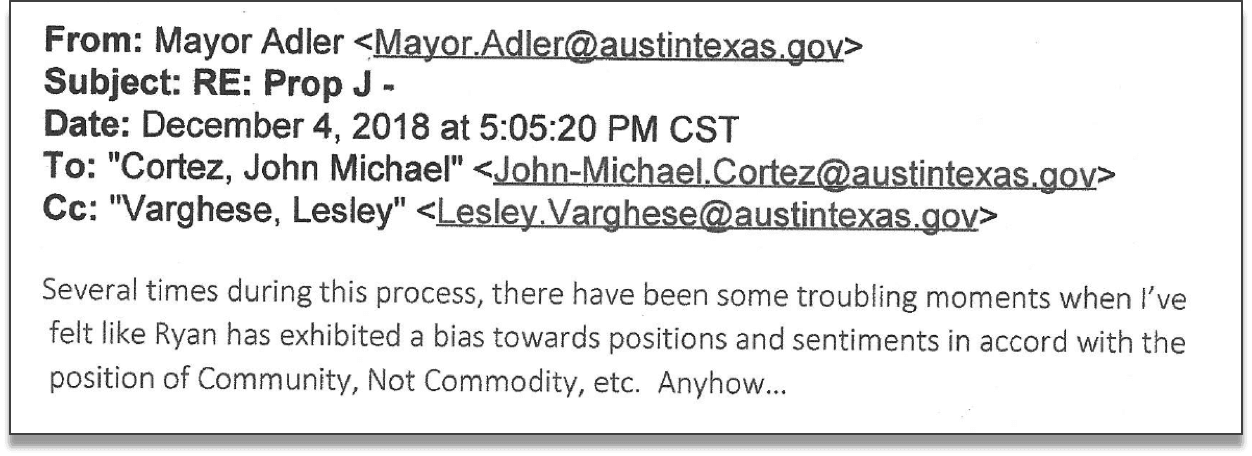
Austin Mayor Steve Adler insists local residents are demanding denser housing, but some of City Hall’s most senior officials think he’s wrong.
After the narrow defeat of Proposition J last November, Adler declared there was “no doubt” that voters wanted to make sweeping changes to the local land code—changes like those proposed by CodeNEXT, which went down in flames late last summer. CodeNEXT would have allowed for bigger, more luxurious housing developments throughout Austin’s single-family neighborhoods, and Proposition J would have given area residents the right to approve plans like it at the ballot box.
During the days and weeks that followed, Adler went looking for proof of that “mandate” for newer, denser housing. In an email exchange obtained by Community Not Commodity, Special Assistant to the Mayor John-Michael Cortez asked City of Austin Demographer Ryan Robinson to produce a map showing how Proposition J fared, neighborhood by neighborhood. Cortez was Adler’s point-person on CodeNEXT, and Robinson agreed to make the map—but first he issued a word of warning:

Cortez’s response is stunning:

Cortez forwarded Robinson’s comments to Adler, but the mayor was undeterred. He immediately wrote off the city’s well-respected demographer as someone who sympathized with Community Not Commodity’s point of view:

Cortez and Robinson have admitted what everyday Austinites have long known: Despite what the mayor and his supporters in the land-development industry may say, there is no public mandate for replacing this city’s existing homes with denser, more luxurious housing. CodeNEXT failed because it prioritized the profits of those same land developers rather than the interests of our community at large.
Unfortunately, it looks like the city manager’s current code rewrite is more of the same. Dubbed “Son of CodeNEXT” by the local media, our city council got the ball rolling this past May, when its members identified the areas of Austin they wanted to redevelop and then labeled them as “transition” zones. Here’s what will happen inside those so-called transition zones if the council approves the plan later this year:
- Existing homes will be rezoned to accommodate multi-unit structures, with no notice given to property owners
- Land developers will be allowed to replace single-family homes with buildings containing 4-20 units and as high as 65 feet
- Land values and property taxes will rise, home sales are likely to result in demolitions, and thousands of Austin families will be displaced
Check this map to see if your home is in a transition zone. If it is, then you’re at risk—and you need to do something about it. Contact Mayor Adler and your city council member today, and tell them this community has not given them a mandate to displace you, your family, and your neighbors! (Click here if you aren’t sure which council member represents you.)
Then, please consider donating to our effort so that we can keep everyday Austinites well-informed.
Together we can build an Austin for everyone!
Mayor Steve Adler:
steve.adler@austintexas.gov | 512-978-2100
Natasha Harper-Madison (District 1):
natasha.madison@austintexas.gov | 512-978-2101
Delia Garza (District 2):
delia.garza@austintexas.gov | 512-978-2102
Sabino Renteria (District 3):
sabino.renteria@austintexas.gov | 512-978-2103
Greg Casar (District 4):
gregorio.casar@austintexas.gov | 512-978-2104
Ann Kitchen (District 5):
ann.kitchen@austintexas.gov | 512-978-2105
Jimmy Flannigan (District 6):
jimmy.flannigan@austintexas.gov | 512-978-2106
Leslie Pool (District 7):
leslie.pool@austintexas.gov | 512-978-2107
Paige Ellis (District 8):
paige.ellis@austintexas.gov | 512-978-2108
Kathie Tovo (District 9):
kathie.tovo@austintexas.gov | 512-978-2109
Alison Alter (District 10):
alison.alter@austintexas.gov | 512-978-2110